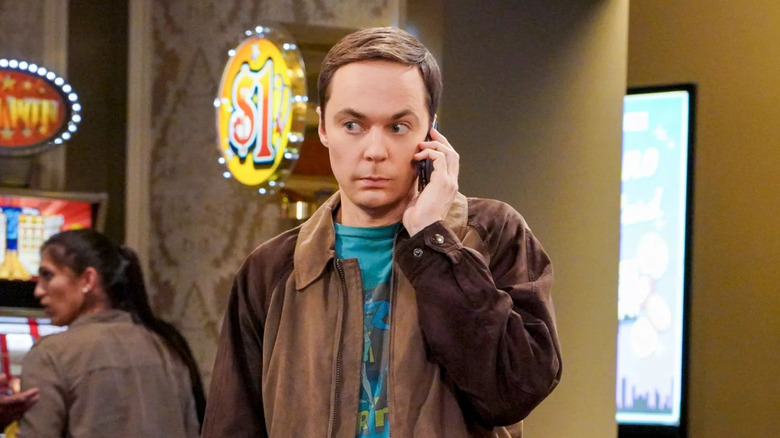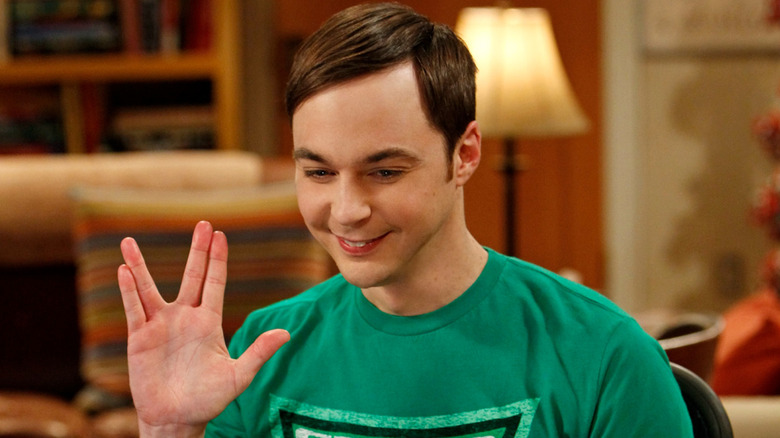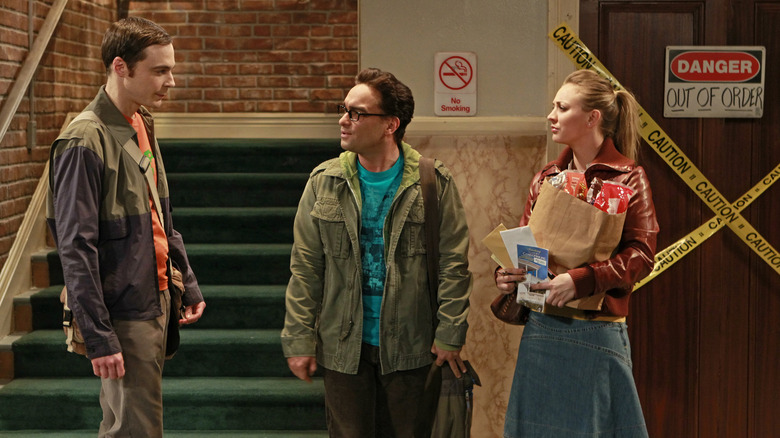The Big Bang Theory's Sheldon Cooper Originally Had A Totally Different Name
We may receive a commission on purchases made from links.
For 12 seasons and years on "The Big Bang Theory," the show's lead character Sheldon Cooper — played by Jim Parsons, whose departure from the show ultimately ended the entire series — defined the series, for better and for worse. Sheldon is a uniquely drawn character, created by Chuck Lorre and Bill Prady (who crafted the show together) and performed perfectly by Parsons. He even won multiple Emmys for the role and the character was popular enough to get his own spin-off, "Young Sheldon," which ran for 7 seasons from 2017 to 2024. (That spin-off also has a spin-off, "Georgie & Mandy's First Marriage," and there's another "Big Bang Theory" spin-off in the works from Max.) At the same time, Sheldon can be frustrating, especially when it comes to the way he treats his friends Leonard Hofstadter (Johnny Galecki) and Penny (Kaley Cuoco), just to name a few ... although in the end, they do always accept him for the stubborn yet brilliant person he is.
Also, he was almost named Kenny.
According to Jessica Radloff's 2022 book "The Big Bang Theory: The Definitive, Inside Story of the Epic Hit Series," Sheldon Cooper very nearly went by "Kenny" (at least for his first name; there's not any information about a potentially different last name for the character). As Radloff put it, Lorre and Prady came up with the idea that two nerds who would originally become Leonard and Sheldon would meet a beautiful girl, Penny, as she moves in across the hall from them, right away ... but the names came later, and they almost influenced the title of the entire show at first.
The Big Bang Theory almost had an entirely different title — based around Sheldon's original name
In Jessica Radloff's book, Bill Prady said that not only did Sheldon bear the name "Kenny" in the original draft of the show that would become "The Big Bang Theory," but the title was different too. "'Lenny, Penny, and Kenny' was the original placeholder title of the show, so Lenny was the Leonard character, and Kenny was the Sheldon character," Prady revealed. "That title lasted for about five minutes. In fact, my contract says, 'Lenny, Penny and Kenny' a/k/a 'Big Bang Theory.'"
So where did Prady and Chuck Lorre get the idea to name Sheldon ... Sheldon? "Those were the names of the characters originally," Lorre said in the book. "But we wanted to pay homage to TV producer-director-actor Sheldon Leonard, so that's where Sheldon and Leonard came from." That triple threat worked on classic comedies like "The Danny Thomas Show," "The Andy Griffith Show," "The Dick Van Dyke Show," and a ton of other major comedy projects — so it just made sense, which is how they landed on Sheldon. What about the main title of the whole show, though?
How did Chuck Lorre and his team settle on The Big Bang Theory?
If you're familiar with Chuck Lorre's body of work, it may not shock you to learn that Lorre used the scientific term "big bang" — which refers to the theory concerning the expansion of the universe — because he liked that it's a double entendre. In fact, he felt inspired by his hit at the time, "Two and a Half Men," which trafficked in fairly raunchy jokes.
"Looking back, this is somewhat embarrassing, but given how much the success of 'Two and a Half Men' impacted me, the title 'The Big Bang Theory' had in it the inkling of a sexual innuendo. And I was crass enough to grasp onto that. I also liked the idea of co-opting something that was already part of the culture." (In that last part, Lorre is referring to the scientific community, though he also notes that he once saw a scientist lamenting the fact that when you search for "the big bang theory" online, the show comes up first.)
As for Bill Prady, he's the first to admit that he wasn't thrilled about the innuendo ... but he didn't push back in the end. "I will say for the record, I'm a prude, and I'm from Michigan, and I did express so very prudish objections to Mr. Lorre," Prady recalled before admitting he couldn't top it. (There's more innuendo for you.) "Problem was, I didn't have a good alternative. And the only way you can get rid of a thing you don't like is with something better. I had nothing better. So I did not fight too hard. But I did lodge a formal objection with whatever mechanism people lodge with each other!"
In the end, "The Big Bang Theory" became one of the most popular sitcoms of all time — to the point where it even broke a streaming record recently on Max, and you can watch it on that platform now.


